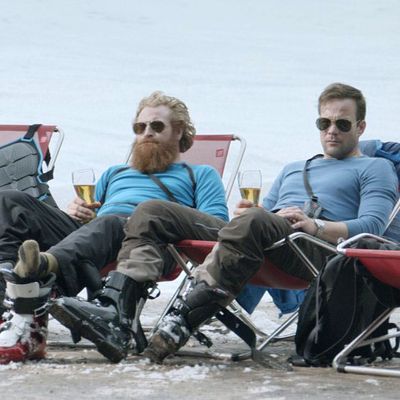
Note: In order to discuss the Alps-set Swedish drama Force Majeure in any depth, it is necessary to reveal a very early event on which the entire narrative hinges. If you believe — wrongly, I think, but it’s your call — that this constitutes a “spoiler” and are merely looking for a thumb up or down, then here is the pertinent judgment: Thumb up, three stars, B+, 89 … Actually, 93 until the climax, which is somewhat opaque. The setting is breathtaking, the cast excellent — and attractive! Back to Rotten Tomatoes, then.
The chic but potent psychodrama Force Majeure centers on a split-second impulse that opens up an immense rift in an attractive Swedish family’s orderly, prosperous existence. The setting is a posh ski resort in the Alps, to which Tomas (Johannes Kuhnke), his wife, Ebba (Lisa Loven Kongsli), and their children, Clara and Vincent, have come to hit the slopes, reinforce their bonds, and look attractive. They really are attractive. They really are. The four sleep in a big bed in matching pajamas and look wonderful in cable-knit sweaters and ski gear. Tidy, slightly off-symmetrical frames, the resort’s polished mahogany wood, and the soundtrack’s snatches of classical music underline the general harmony. When, at dinner in the swank restaurant, Tomas and Ebba meet a Swedish woman who has left her family for a week to canoodle with men, they are polite but visibly taken aback. For them, family is all.
The only dissonant notes are the distant booms and puffs of snow from controlled explosions, a technique designed to increase the uniformity of snow packs and lessen the threat (and power) of avalanches. (I know this from research on the internet — it’s not spelled out in film.) On the second day, as the family eats lunch on a terrace overlooking the vast mountain range, an explosion proves a bit too powerful, and what looks like an avalanche — a tsunami of snow — heads the diners’ way. Everyone scatters, Ebba throws herself on the two children, and Tomas — well, there’s the rub. He grabs his sunglasses and cell phone and dashes out of the frame, leaving his family behind. The “avalanche” turns out to be nothing but a snowy mist, and as Ebba, Clara, and Vincent pick themselves up and look around for Tomas, a different kind of chill settles over them.
I don’t know about you, but from my stern judgmental perch, Tomas’s response is a mortal sin — an unforgettable, unforgivable breach. Back in their room, Ebba gazes, hurt and angry, at Tomas, while the children lapse into silence, sensing the immensity of what just happened. And that’s the real start of Force Majeure. What will Ebba do now? And how will Tomas account for his cowardice when his family seemed threatened?
A puckish Swedish, the writer-director Ruben Ostland slips into a tone that makes Force Majeure almost seem like a deadpan — frozen — comedy. He maintains those orderly compositions, that classical music. But the tension, the sense of danger, accumulates. For Tomas will simply not acknowledge what happened. He did not see it the way Ebba and the children did. It is, he insists, a difference of opinion. Mostly, however, he clams up while Ebba writhes, finally blurting out what happened to strangers, including a red-bearded fellow who looks like Fagin (Game of Thrones’ Kristofer Hivju) and his blonde, 20-year-old girlfriend. (He has left his own children behind to pursue his amours.) While Tomas goes mute, Redbeard attempts to account for his fellow patriarch’s behavior. Perhaps Tomas went into “survival mode” and — much as adults in planes are told to put on their own oxygen masks before they turn to their children—was keeping himself safe to able to return to the terrace and dig his family out. His words hang in the air and then sadly dissipate, leaving no residue.
Yes, it’s funny and appalling watching Kuhnke frozen in denial, sinking deeper and deeper into himself, while Kongsli’s Ebba keeps calling the question in a manner that seems uncharacteristic. But she is simply unable to process what she saw. The husband and wife spend time apart on the slopes, alone in the immensity. In a wrenching, serious scene, the boy and girl weep in Tomas’s arms, fearful that their father and mother will divorce. There is a sameness to the rhythms of Force Majeure, but the effect isn’t monotonous — it’s of a slow cloud of ice particles moving toward us. Will Tomas ever break? What can he possibly say? Is there a difference in the way men and women react to crises with their children in tow — are mothers more inherently protective? Or is this an extraordinary case?
The mixture of absurdity and anguish makes Force Majeure unlike any film I’ve seen, but I don’t know what to make of its penultimate scene, in which Tomas leads his family into a final ski run in zero visibility, assuring them he knows what he’s doing. The resolution seems meant to be ironic, but it’s hard to tell. After that comes a denouement that’s somewhat easier to read and ends the film on a thunderously unnerving note. It is a film that makes your murmur in amazement as you watch and then brood on the dangerous corners in all our lives. It’s a quiet avalanche.


